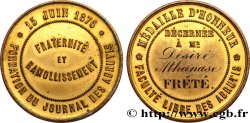fme_932496 - III REPUBLIC Médaille, Marie-Antoine Carême, Société des pâtissiers français
55.00 €(Approx. 57.75$ | 46.20£)
Quantity
Add to your cart

Type : Médaille, Marie-Antoine Carême, Société des pâtissiers français
Date: n.d.
Metal : gilt bronze
Diameter : 50 mm
Orientation dies : 12 h.
Engraver CONTAUX Georges (1891-1984)
Weight : 56,77 g.
Edge : lisse
Puncheon : sans poinçon
Coments on the condition:
Patine hétérogène avec quelques taches d’oxydation sur les contours des reliefs. Présence de quelques traces d’usure, coups et rayures
Obverse
Obverse legend : .ANTONIN. CAREME. 1784. 1833..
Obverse description : Buste de jeune homme de trois quart vers la droite. Signé : G. CONTAUX.
Reverse
Reverse legend : .S.TE DES PATISSIERS FRANCAIS. // LA / SAINT- MICHEL.
Reverse description : Légende en 3 lignes dans un médaillon entouré de branches de chêne et laurier. Cartouche vierge à l’exergue.
Commentary
Médaille conservée dans une boîte rouge ronde, avec une fermeture un peu endommagée.
Marie-Antoine Carême dit Antonin Carême est un pâtissier et un chef français né le 8 juin 1783 à Paris où il meurt le 12 janvier 1833. Surnommé « le roi des chefs et le chef des rois », il est le premier à porter cette appellation de « chef ».
L'influence de Carême sur le monde culinaire est à la fois pratique et théorique. On lui doit la création de la toque, en 1821, lors de son séjour à Vienne au service de lord Charles Stewart ; outre l'élaboration de nouvelles sauces, il publia une classification de toutes les sauces en quatre groupes de base : la sauce allemande, la sauce béchamel, la sauce espagnole et le velouté. Il serait également à l'origine du remplacement de la pratique du service à la française (service de tous les plats à la fois) par le service à la russe (qui dessert chaque plat dans l'ordre imprimé sur le menu) après son retour de la cour de Russie, mais les avis divergent sur ce point.
Marie-Antoine Carême dit Antonin Carême est un pâtissier et un chef français né le 8 juin 1783 à Paris où il meurt le 12 janvier 1833. Surnommé « le roi des chefs et le chef des rois », il est le premier à porter cette appellation de « chef ».
L'influence de Carême sur le monde culinaire est à la fois pratique et théorique. On lui doit la création de la toque, en 1821, lors de son séjour à Vienne au service de lord Charles Stewart ; outre l'élaboration de nouvelles sauces, il publia une classification de toutes les sauces en quatre groupes de base : la sauce allemande, la sauce béchamel, la sauce espagnole et le velouté. Il serait également à l'origine du remplacement de la pratique du service à la française (service de tous les plats à la fois) par le service à la russe (qui dessert chaque plat dans l'ordre imprimé sur le menu) après son retour de la cour de Russie, mais les avis divergent sur ce point.








 Report a mistake
Report a mistake Print the page
Print the page Share my selection
Share my selection Ask a question
Ask a question Consign / sell
Consign / sell
 Full data
Full data









